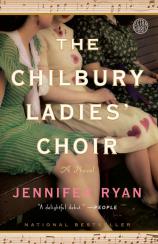The Chilbury Ladies’ Choir
Review
The Chilbury Ladies’ Choir
The year is 1940. The setting is Chilbury, a small village just seven miles from the coast at Dover, England. The time frame is March through September. World War ll is raging on, but the enemy has not yet arrived on the British Isles as the book begins. Children from London have been evacuated to the supposed safety of the countryside. All able-bodied men are in service to King and Country. The vicar abruptly disbanded the church choir due to the lack of male voices, and the choir ladies are mightily upset. With the arrival of a force of nature, a music education teacher named Prim, the choir is reborn as the Chilbury Ladies' Choir. Once again, music accompanied by blended, earnest voices fills the air.
"THE CHILBURY LADIES’ CHOIR is written in diary and letter form, but in no way does this detract from the story as the dialogue is brisk, the writing is fresh, and it is most interesting to read the frank emotions of those writing..."
The Chilbury Ladies' Choir is composed of women of various ages, personalities and singing abilities. Each woman or girl is dealing with the looming war and its worries and hardship in her own way. Venetia, a lovely, young aristocrat, misses her beau until a handsome young artist named Alastair arrives in Chilbury and they begin a torrid relationship. Venetia's young sister, Kitty, has a lovely voice and a penchant for gossip. An unscrupulous young midwife, Edwina, joins the group. She wants to remain current about what is going on and hopes to wrap herself in a bit of respectability as a choir member. Edwina is offered a large sum of money by Venetia's very unpleasant and temperamental father, whose young wife is once again expecting, to switch newborns to ensure that his family remain in their estate. His only son and only heir to the family fortune was just killed in the war. Mrs. Tilling, the village nurse and timid widow, is worried about the safety of her only child, a son serving in the military.
War has affected every family and every household. Mrs. Tilling, against her wishes, is required to billet a total stranger, a colonel, in her home. Venetia's family has temporarily taken in a young Jewish refugee. There are shortages, rationing, evening blackouts, air-raid drills, worries over men serving in the military, and the ever-present fear of the Nazis breaching the small island nation. But life, such as it is, goes on. There are those who take advantage of war with the black market, and there are those using blackmail to obtain what they hope will be riches.
Adding to the drama, Venetia finds herself pregnant, and Alastair mysteriously disappears during a bombing raid that kills Prim and her neighbor, Hattie, and levels Alastair's house. Where has Alastair gone, and was he an enemy spy since he disappeared during the bombing? Mrs. Tilling tends to a dying soldier and promises to return a ring to the soldier's lover. Homosexuality is a punishable crime, but Mrs. Tilling is determined to carry out her deathbed promise. She meets Carrington, to return his ring, and begins to question why homosexuality is a crime. After all, isn't love in any form just love?
THE CHILBURY LADIES’ CHOIR is written in diary and letter form, but in no way does this detract from the story as the dialogue is brisk, the writing is fresh, and it is most interesting to read the frank emotions of those writing, namely Venetia, Kitty, Edwina and Mrs. Tilling. War changes everything and everyone. This well-written and absorbing tale will stay with the reader for a long time to come. Jennifer Ryan has created a wonderful debut novel, and it is hoped that she is at work on another book.
Reviewed by Carole Turner on February 17, 2017
The Chilbury Ladies’ Choir
- Publication Date: September 5, 2017
- Genres: Fiction, Historical Fiction, Women's Fiction
- Paperback: 416 pages
- Publisher: Broadway Books
- ISBN-10: 1101906774
- ISBN-13: 9781101906774





